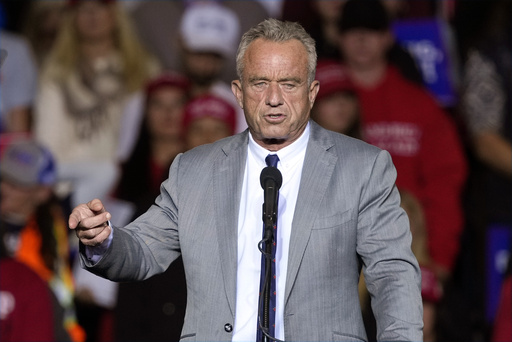
WASHINGTON — Robert F. Kennedy Jr., known for his critiques of public health policies and his anti-vaccine stance, has cultivated a significant following that fiercely supports his viewpoint. His positions have put him in opposition to a large contingent of professionals at the Department of Health and Human Services (HHS), particularly following President-elect Donald Trump’s consideration of him for a leadership role in the agency.
Kennedy’s potential confirmation would grant him oversight of the largest public health entity globally, which manages a staggering budget of $1.7 trillion. This agency plays a pivotal role in American health care by providing insurance for nearly half the population, including low-income, disabled, and elderly individuals. Its responsibilities encompass research on vaccines, illnesses, and treatments, regulation of medications, and food safety inspections.
Kennedy has been vocal about his intentions to reform several agencies under HHS, particularly the Food and Drug Administration (FDA). He recently stated that the “FDA’s war on public health is about to end,” and issued a warning to its employees to prepare for significant changes. The FDA employs around 18,000 individuals and is tasked with ensuring the safety and efficacy of medical products, food, cosmetics, and more. His history highlights a contentious relationship with the agency, evidenced by his organization, Children’s Health Defense, which called for a halt to all COVID-19 vaccinations. He has criticized the FDA for being influenced by pharmaceutical companies, citing its reliance on industry fees for funding.
Kennedy has pledged to make sweeping changes at the FDA, aiming to dismantle entire departments, including those related to food safety which focus on preventing foodborne illnesses and promoting health. He has threatened to dismiss FDA personnel for what he terms the “aggressive suppression” of alternative therapies and has openly criticized the agency’s safety assessments regarding several controversial health products.
Kennedy has also commented directly on the Centers for Disease Control and Prevention (CDC), suggesting potential policies to eliminate fluoride from drinking water, which is currently recommended for its cavity-reducing benefits. Kennedy, who has vehemently opposed vaccines, would also have significant influence over vaccine recommendations, impacting both pediatric vaccinations and those intended for adults.
Kennedy’s plans extend to the National Institutes of Health (NIH), where he has expressed a desire to restructure the agency to increase funding for alternative health approaches and reduce conflicts of interest among researchers. The NIH plays a crucial role in funding medical research across various fields, but Kennedy has previously criticized it for its vaccine studies, particularly regarding autism.
Regarding the Centers for Medicare and Medicaid Services, Kennedy has shown a preference for healthcare strategies that prioritize preventive measures and lifestyle changes over expensive drug treatments. He has emphasized the need for wellness programs, such as gym memberships and nutritious food access, over existing drug coverage.
Should he be confirmed, Kennedy’s substantial changes could influence various facets of public health policy and funding in the United States, from vaccine administration to healthcare coverage strategies.
